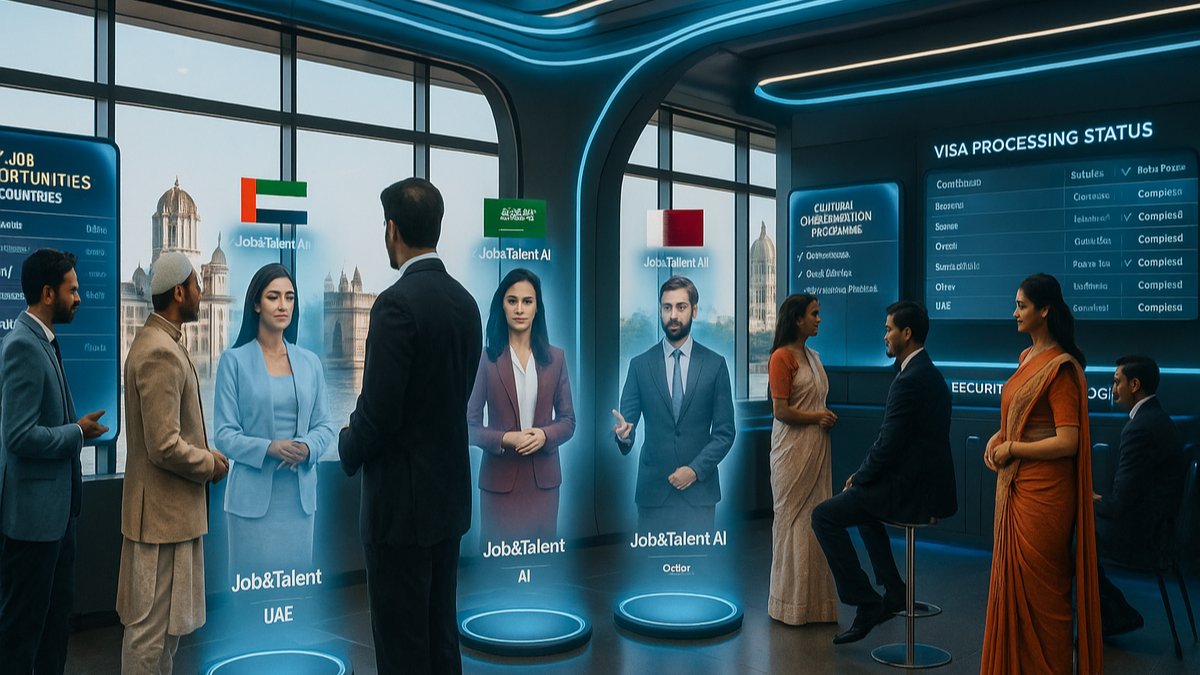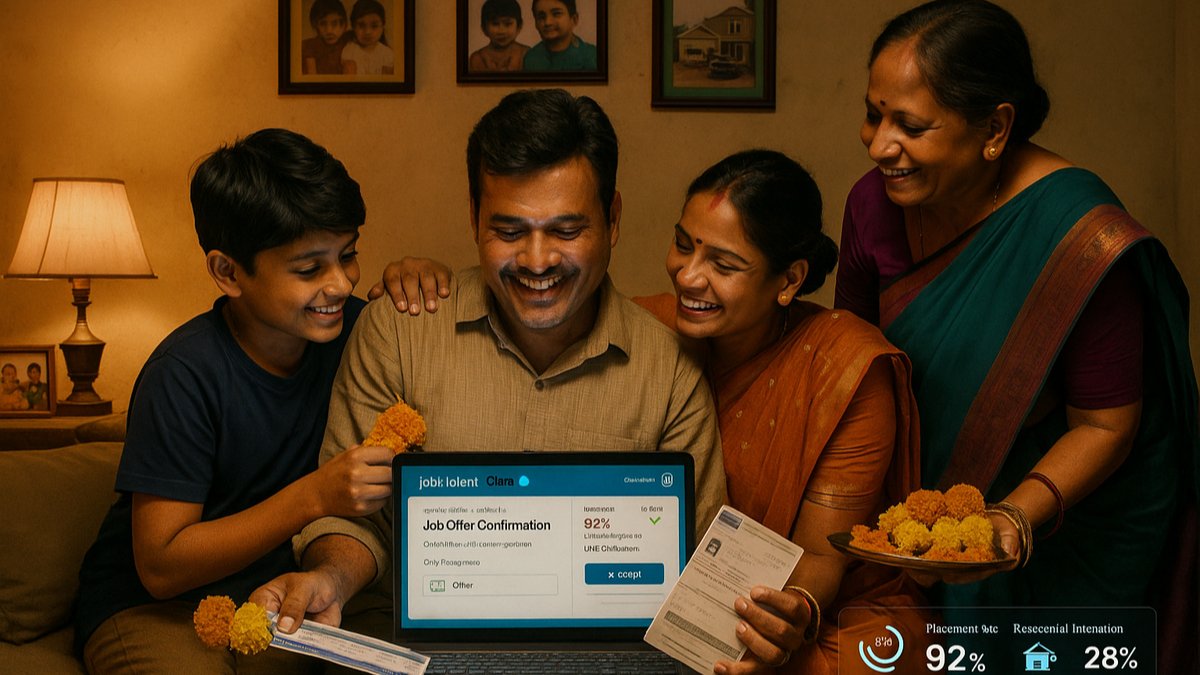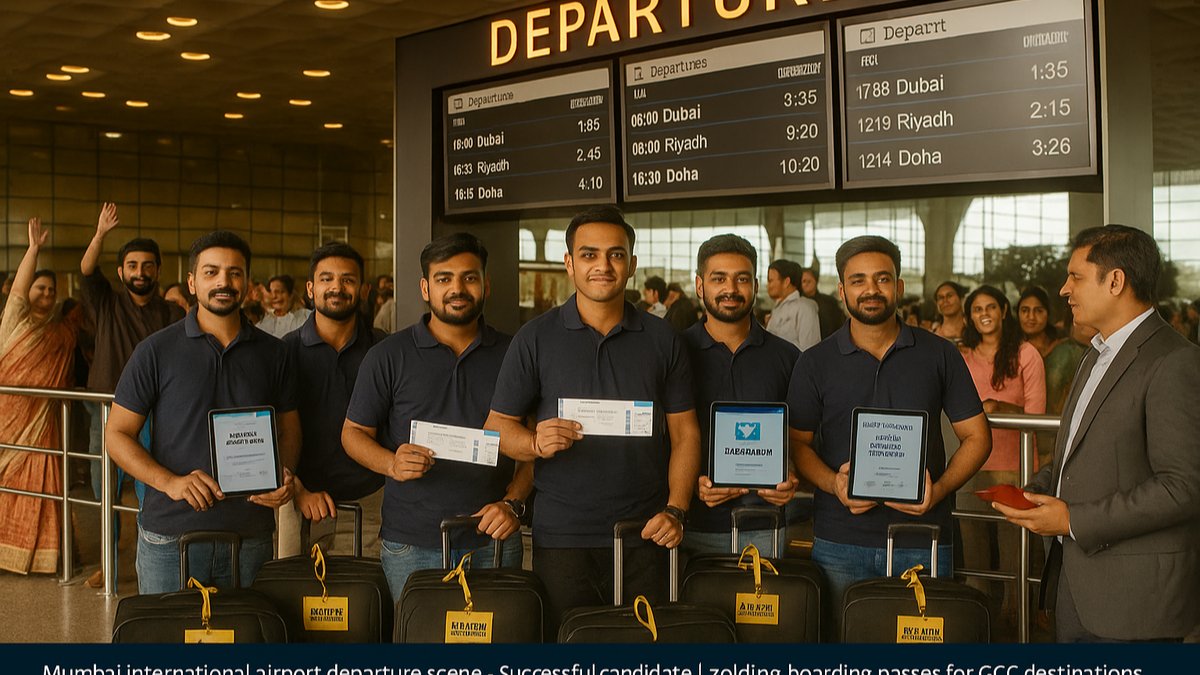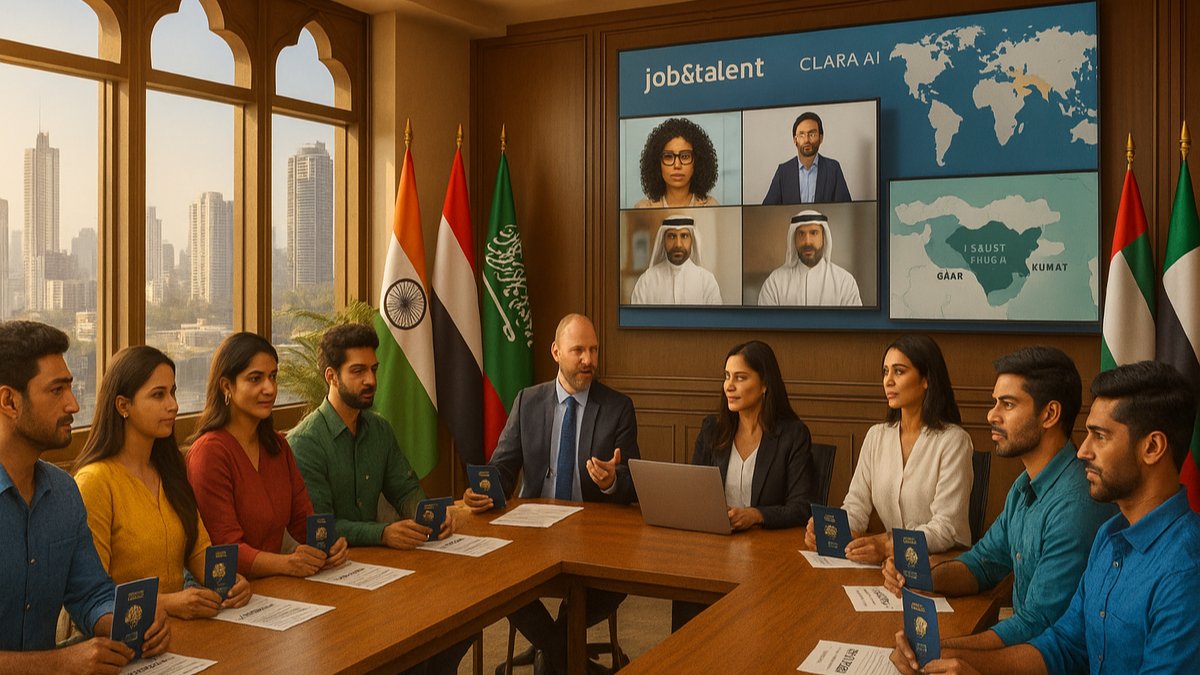Job and Talent AI Agents: The overseas recruitment industry stands at a transformative crossroads that will reshape how agencies connect talent with opportunities across the Gulf Cooperation Council (GCC) countries and the broader Middle East region. While traditional recruitment agencies struggle with manual processes and geographical limitations, Job&Talent’s AI agents are already conducting over 190,000 interviews and facilitating 22,000+ successful international placements, fundamentally redefining professional responsibility in cross-border talent acquisition.
For overseas recruitment agencies operating from Mumbai and other major Indian cities, serving clients across the UAE, Saudi Arabia, Qatar, Kuwait, Oman, and Bahrain, understanding these AI developments isn’t just about staying competitive; it’s about preparing for a future where professional responsibility extends across AI-mediated international employment relationships that affect thousands of migrant workers and their families.
Job and Talent AI Agents: The AI Revolution in International Talent Mobility
Job and Talent AI Agents: Job&Talent’s recent EUR 92 million Series F funding round signals institutional confidence in AI-powered workforce management that has profound implications for overseas recruitment agencies serving GCC markets. Their comprehensive AI agent suite—Clara (recruitment), Sara (attendance coaching), Teo (account management), and Maria (performance coaching)—addresses challenges that are particularly acute in international recruitment contexts.
Clara’s ability to conduct interviews 24/7 across multiple languages directly addresses the time zone complexities that overseas recruitment agencies face when coordinating between Indian talent pools and Middle Eastern employers. Her impressive 90% candidate satisfaction rate and 65% faster processing times compared to traditional methods solve critical challenges around candidate engagement and placement velocity that determine success in competitive GCC labour markets.
Job and Talent AI Agents: The scale advantages are particularly significant for agencies handling high-volume recruitment for construction projects, hospitality expansion, healthcare system growth, and retail sector development across Gulf countries. Clara’s recent success in reducing hiring timelines from 8 weeks to 3 weeks for thousands of workers demonstrates exactly the type of efficiency that GCC employers demand during major infrastructure projects or seasonal business expansions.
Professional Responsibility Across International Boundaries

Job and Talent AI Agents: The integration of AI agents into overseas recruitment processes creates unprecedented professional responsibility challenges that span multiple legal jurisdictions, cultural contexts, and regulatory frameworks. When AI systems make decisions affecting international worker placement, visa sponsorship, and cross-border employment relationships, the implications extend far beyond traditional recruitment accountability.
Traditional professional responsibility in overseas recruitment relied heavily on human agents who understood complex visa requirements, cultural adaptation challenges, and family separation issues that affect international workers. AI agents must now demonstrate sophisticated understanding of these factors while maintaining transparency about decision-making processes that affect life-changing employment opportunities.
Job and Talent AI Agents: The challenge becomes more complex when considering that overseas recruitment decisions affect not just individual workers but entire families and communities in origin countries. Professional responsibility frameworks must address how AI systems evaluate candidates for international placement while considering factors like family financial dependency, cultural adaptation potential, and long-term career development in foreign countries.
Navigating GCC Labor Market Complexities
Job and Talent AI Agents: The GCC region’s diverse regulatory environments, labour law frameworks, and cultural expectations create specific professional responsibility requirements for AI-powered recruitment systems. When Clara evaluates candidates for positions across different Gulf countries, she must understand not just technical qualifications but also visa category requirements, cultural fit assessments, and compliance with evolving labour protection regulations.
Recent labour law reforms across GCC countries, including Saudi Arabia’s Vision 2030 initiatives, the UAE’s updated employment frameworks, and Qatar’s worker protection enhancements, require AI systems to maintain current knowledge of regulatory changes that affect international worker placement and employment conditions.
Job and Talent AI Agents: Professional responsibility in this context means ensuring that AI agents can navigate complex regulatory landscapes while protecting worker interests and maintaining employer compliance across multiple jurisdictions simultaneously. Future of work.
Cultural Intelligence and International Placement
Job and Talent AI Agents: Successful overseas recruitment requires sophisticated cultural intelligence that enables accurate assessment of candidate adaptation potential and employer-employee compatibility across different cultural contexts. When AI agents evaluate Indian professionals for placement in GCC countries, they must consider factors beyond technical qualifications.
Cultural Adaptation Assessment: AI systems must evaluate candidates’ ability to adapt to different cultural environments, communication styles, and workplace expectations without perpetuating stereotypes or cultural biases.
Family Impact Consideration: International placement decisions affect entire families, including spouse employment opportunities, children’s education options, and extended family support systems that influence placement success.
Career Development Trajectory: AI agents must consider how international placement affects long-term career development, skill acquisition, and eventual repatriation or permanent settlement options.
Ethical Frameworks for Migrant Worker Protection

Job and Talent AI Agents: The most critical professional responsibility challenge involves ensuring that AI-powered recruitment systems actively protect migrant worker interests rather than simply optimising placement efficiency. This requires embedding worker protection principles into AI decision-making algorithms and maintaining human oversight for complex ethical situations.
Fair Contract Negotiation: AI systems must be programmed to identify and flag employment contracts that don’t meet international labour standards or provide adequate worker protections.
Transparent Fee Structures: Professional responsibility requires clear disclosure of all recruitment fees, visa costs, and employment-related expenses that workers may incur during international placement processes.
Ongoing Support Systems: AI agents like Sara, who provides attendance coaching, and Maria, who focuses on performance coaching, must be adapted to provide culturally sensitive support for international workers facing adaptation challenges.
Technology Integration with Human Oversight
Job and Talent AI Agents: The most successful implementations of AI-powered overseas recruitment maintain strong human oversight for decisions that significantly impact worker welfare and international employment relationships. This hybrid approach leverages AI efficiency while preserving human judgement for complex cultural and ethical considerations.
Complex Case Escalation: Situations involving family emergencies, cultural conflicts, or employment disputes must maintain clear escalation paths to human agents with cultural competency and international employment expertise. AI attendance coach.
Cultural Sensitivity Training: AI systems require continuous training on cultural nuances, religious considerations, and social factors that affect successful international employment relationships.
Regulatory Compliance Monitoring: Human oversight ensures that AI systems maintain compliance with evolving labour laws, visa requirements, and worker protection regulations across multiple jurisdictions.
Building Trust in AI-Mediated International Recruitment
Job and Talent AI Agents: Success in overseas recruitment depends on building trust among candidates, employers, and regulatory authorities across different countries. This trust must be earned through transparent operations, consistent ethical practices, and demonstrated commitment to worker welfare throughout international employment relationships.
Transparent Communication: Candidates must understand how AI systems evaluate their suitability for international placement and what factors influence country and employer matching decisions.
Outcome Accountability: AI systems must demonstrate measurable improvements in placement success, worker satisfaction, and employer retention compared to traditional recruitment methods.
Regulatory Compliance: Professional responsibility requires proactive compliance with labour laws, worker protection regulations, and international employment standards across all operating jurisdictions.
The Future of Responsible International Recruitment

Job and Talent AI Agents: As AI technology continues advancing, overseas recruitment agencies must balance efficiency gains with enhanced professional responsibility standards that protect migrant worker interests and support sustainable international employment relationships.
Job&Talent’s AI agents provide a model for this integration, demonstrating that advanced technology can enhance rather than compromise professional responsibility in international recruitment. Their emphasis on transparency, continuous monitoring, and human oversight offers a framework for AI deployment that supports both business efficiency and worker welfare.
Job and Talent AI Agents: The agencies that thrive in the AI era will be those that can harness technological capabilities while maintaining unwavering commitment to ethical practices, cultural sensitivity, and worker protection that reflects the best traditions of professional recruitment services.
Preparing for Transformation
Job&Talent AI Agents: The transformation represented by Job&Talent’s AI agents is accelerating rapidly, and overseas recruitment agencies must prepare for an international employment ecosystem where AI intermediaries become standard practice rather than a competitive advantage.
This preparation requires investment in technology integration, staff training on AI oversight, and development of ethical frameworks that ensure AI systems support rather than compromise the human dignity and economic opportunity that motivate international labour mobility.
The future of overseas recruitment lies not in choosing between human expertise and AI efficiency, but in creating integrated approaches that leverage the best of both while maintaining professional responsibility standards that honour the trust placed in recruitment agencies by workers seeking better lives and employers building better businesses.
Job and Talent AI Agents: The most successful overseas recruitment agencies will be those that embrace AI as a powerful tool for enhancing human potential while maintaining unwavering commitment to worker welfare, cultural sensitivity, and professional responsibility that puts people first in every international placement decision.

